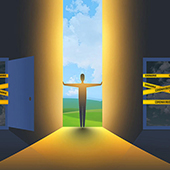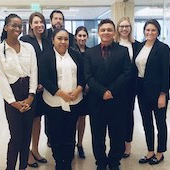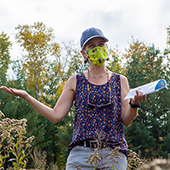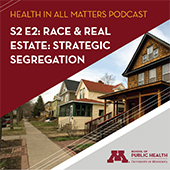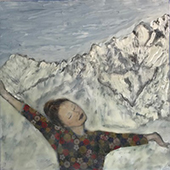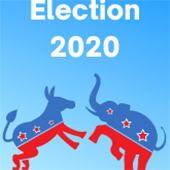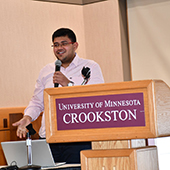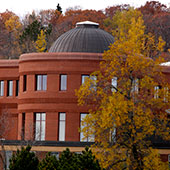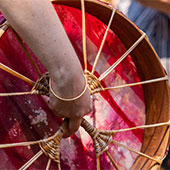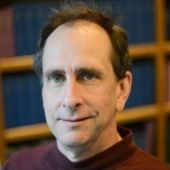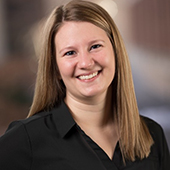- Features: How I spent the summer of COVID-19; Immigration and Human Rights Clinic helps Mexican family win asylum; Global nutrient study explores ecosystem change, fuels learning.
- Awards and Recognition: The U of M will lead a $2 million NSF grant to create an international network to accelerate the discovery and development of quantum information systems; and more.
How I spent the summer of COVID-19
For many University of Minnesota students, the move to distance learning in March was merely the first brush stroke COVID-19 would paint on their lives. As the pandemic showed no signs of abating, summer plans to study abroad or gain experience through internships were often postponed or scuttled. Suddenly faced with open calendars, students had to look for other options. Meet three U of M students who found a silver lining after the pandemic changed their plans.
Immigration and Human Rights Clinic helps Mexican family win asylum
A Mexican family that narrowly escaped cartel members who opened fire on the family’s car in broad daylight, striking the mother and father several times and causing her to lose an unborn child, is “ecstatic” after overcoming the odds—again—to win asylum in the United States. A key to the victory was the dedication of students in the Immigration and Human Rights Clinic, including current student directors Emily Hauck and Kristin Trapp.
Global nutrient study explores ecosystem change, fuels learning
At 140 sites in 26 countries across the globe, researchers are working to understand how human activities are changing grassland ecosystems. This collaborative effort, led by faculty in the University of Minnesota’s College of Biological Sciences, is known as the Nutrient Network. When it started in 2007, the project became the world’s first globally coordinated experiment to measure the effects on ecological systems of nitrogen coming into ecosystems from agriculture and fossil fuel combustion.
Awards and Recognition
The U of M will lead a five-year, $2 million NSF grant to create an international “network-of-networks” that seeks to accelerate the discovery and development of quantum information systems; a multi-region, multi-institution research and outreach proposal led by the U of M has been awarded a two-year, $1 million grant to assess the impact of COVID-19 on food and agricultural systems and to develop strategies for coping with future crises; Tai Mendenhall has been honored with the Excellence in Professional/Clinical Practice Award from the National Council on Family Relations; David Johnson is the 2020 recipient of the Council for Exceptional Children’s Division on Career Development and Transition Patricia L. Sitlington Research Award; U in the News features highlights of U faculty and staff cited in the media. Awards and Recognition
Benefits Open Enrollment and Virtual Fair available now
Benefits Open Enrollment is open in MyU from Nov. 1 through Nov. 30. Employees can change medical or dental plans, enroll in an FSA, and make changes to disability coverage or additional life insurance. It’s also the one time during the year that you can add or drop eligible dependents from coverage without a qualifying event. View the Open Enrollment website to learn what action should be taken, or try the new Virtual Benefits Fair to learn more about your options.
Social Justice Impact Grants announced
The Office of the Vice President for Research has announced a grant program aimed at catalyzing rigorous, solution-oriented research on social justice topics. The Social Justice Impact Grants (SJIG) program seeks proposals that address criminal justice reform, housing segregation/gentrification, systemic racism, achievement gaps, health disparities, environmental justice, and related topics. The program will fund three to six awards per year with total budgets of $25,000-$50,000 for a 12-month period. SJIG funds are not meant to provide sole support for research activities; applicants who leverage other (external) funds and U of M resources will be prioritized.
U of M joins national alliance aimed at developing a more inclusive and diverse STEM faculty
The University of Minnesota announced it’s one of 19 universities joining a three-year institutional change effort to develop inclusive faculty recruitment, hiring, and retention practices. The Association of Public and Land-grant Universities co-leads the effort, known as Aspire: The National Alliance for Inclusive & Diverse STEM Faculty.
Health in All Matters podcast: Episode 2: Race & Real Estate: Strategic Segregation
Where we live is intimately linked to our health—the life expectancy of a child born in a poor neighborhood can be 20 to 30 years shorter than a child born in an upscale neighborhood just a few miles away. For decades, we have used practices and policies in service of “strategic segregation,” concentrating poverty and people of color in the most unhealthy areas of a city. In this episode, the School of Public Health explores this legacy and how to create better opportunities for housing and health.
Post-election conversations with family and friends
Richelle Moen, an assistant professor of psychiatry in the University of Minnesota Medical School and a licensed psychologist and marriage and family therapist with M Health Fairview, explains how families and other social groups can navigate political conversations post-election.
Pediatric cancer study focuses on possible genetic risk factors for acute lymphoblastic leukemia
Logan Spector, Department of Pediatrics, recently received a $3 million grant from the National Cancer Institute to study the role of genetic admixture in risk and outcome of acute lymphoblastic leukemia in Black children.
International research partnership looks to improve how ACL revision outcomes are predicted and treated
The anterior cruciate ligament (ACL) is a vital knee stabilizer responsible for maintaining balance and function. ACL injuries are common and can cause prolonged pain, instability, and an increased risk of post-traumatic osteoarthritis. Kyle Martin, Department of Orthopedic Surgery, is partnering with the University of Oslo to develop an in-clinic calculator to predict the risk of ACL reconstruction failure at a patient-specific level.
Unlocking the agricultural data revolution
In one word, what do farmers, scientific researchers, private-sector companies, NGOs, government agencies and others need in common to succeed in their respective agricultural endeavors? Data. The University of Minnesota recently convened world-class leaders from multiple sectors to explore opportunities in the management and use of agricultural data to benefit farmers and beyond.
10 things to do at the Arb in November
October snow brought wintery scenes to the landscape a bit earlier than anticipated, but there’s no need to hibernate. From winter lights and the AppleHouse to recipe exhibits and a prescription for artwork, here are 10 things to check out at the Arboretum this month.
Research Brief: A genetic test predicts THC versus CBD in cannabis plants
Industrial hemp growers monitor cannabis sativa plants throughout the season and send samples off for chemical analysis, but THC levels peak at the plant’s maturity and can catch growers off guard. If the crop exceeds federal THC levels, the growers must destroy the crop. A University of Minnesota-led research team has validated a simple genetic test that can predict whether a plant will produce mostly the CBD or THC molecule. Additional recent Research Briefs include “Differences in decision making between females and males” and “Quality of grocery store website product nutrition information online.”
U of M featured virtual events
Nov. 4 - What Happened in the 2020 Elections
Nov. 5 - Food Rituals in the Diaspora
Nov. 9 - The Future of U.S. Foreign Policy
Nov. 13 - 3-Minute Thesis Competition
Nov. 16 - Women Innovators Conference: Inclusive Innovation
Nov. 18 - International Holodomor Memorial Day: Teaching a Genocide the World Forgot
Crookston junior breaks new ground for his family
Vinayak Sharma, a native of New Delhi, India, never truly saw himself pursuing his undergraduate career in the United States. Continuing his education in a country other than his own was a thought that had not crossed Sharma’s mind until he flew halfway across the world in the 8th grade as part of Model United Nations, acting as a diplomat. Looking back, Sharma appreciates the steps he took that led him to where he is today.
In memory of George Floyd
Mahjur Ahmed, a computer science major, is the first recipient of the UMD Scholarship in Memory of George Floyd, Jr. Following Floyd’s killing, Ahmed, a talented photographer, went to Minneapolis to capture images of the protests. While most news organizations were covering the nightly chaos, Ahmed saw people coming together during the day to clean up the streets. “I wanted to capture the hope that I saw.”
Library building celebrates 20th anniversary
When former Chancellor Kathryn A. Martin came to UMD in 1995, erecting a new library was one of her first priorities. The building was designed with input from library staff who desired a highly functional space that would be flexible enough to meet changing needs. The building opened in 2000. In 2013, the library was named for Martin, who had championed its creation.
‘Oshkii Ayaawag’: Empowering Native American Youth During COVID-19
Anna Wirta Kosobuski, Department of Biomedical Sciences on the Duluth campus, received a COVID-19 grant to identify elements for effective, culturally grounded therapy models for Native American youth. U of M Medical School researchers report that Native American youth have a disproportionate share of Minnesota’s mental and behavioral health disorders and associated mortalities, yet access to services and therapies are often limited.
Anderson featured in U.S. News and World Report
Professor of Statistics Jon Anderson answers “What Statistics Is and How to Become a Statistician” in U.S. News and World Report. A recipient of the U of M Morris Alumni Association Teaching Award, Horace T. Morse-Minnesota Alumni Association Award, and U of M Center for Transportation Studies Robert C. Johns Research Partnership Award, Anderson is an expert on biostatistics and time-to-event data analysis.
U of M Morris receives $2 million in HEAPR funding
U of M Morris received $2 million in Higher Education Asset Preservation and Replacement (HEAPR) funding as a result of the capital investment bonding bill recently signed by Governor Tim Walz. The campus will use the funding to address utility repairs and upgrades, HVAC control upgrades, water infiltration issues, and accessibility enhancements.
Mayo Clinic and UMR announce Mayo Clinic Invest In Success Scholars program
The Mayo Clinic and University of Minnesota Rochester have announced the launch of the Mayo Clinic Invest In Success Scholars program. This program aims to increase learning opportunities for students seeking a career in health care and provides annual four-year scholarships to a recruited cohort of students who demonstrate financial need. “The diversity of perspectives brings about innovation. Sustaining equity is critical. The experiences that the Mayo Clinic Invest In Success Scholars program provide are the kinds of experiences that contribute to equity,” says UMR Chancellor Lori Carrell.
UMR Career Pathways: Health Care Research and Discovery
With one focus and unlimited career possibilities, UMR's innovative degree programs provide students with a foundational undergraduate education in health sciences. Discover how Rachel Codden’s UMR experience prepared her for a masters in public health at the University of Minnesota Twin Cities and for her current role as a biostatistician at the University of Utah School of Medicine. Codden analyzes and interprets data that eventually become the basis of manuscripts. Learn more about UMR’s Health Care Research and Discovery Pathway.
Highlighting trans activists
The Tretter Collection in GLBT Studies at the University of Minnesota has just released the first 20 interviews from phase two of the Tretter Transgender Oral History Project. The activists featured are working to overcome barriers that trans people experience in the areas of housing insecurity, police violence, health care, and other justice issues.
An udder win-win
What if veterinary researchers could help dairy producers decrease their antibiotic use while improving animal welfare? This fall, a team at the University of Minnesota College of Veterinary Medicine is rolling out a program, four years in the making, that could accomplish just that.
Investigating the news
The landscape of news media has changed and to navigate it, news consumers need to be savvy, journalism students need to be curious, and reporters need to be ethical. A reporter, a journalism professor, and a library expert share their expertise about the changing media landscape.
Decoding man’s best friend
Researchers have discovered a genetic mutation in dogs that could benefit urinary stone management in both humans and their best friends. Armed with this knowledge, veterinarians will be better equipped to prevent urinary stones and save dogs from needing surgery later on.
Campus bus service survey
Parking and Transportation Services is looking for feedback on campus bus service (Campus Connector and Campus Circulator). Fill out the confidential survey and learn more at Parking and Transportation Services.
